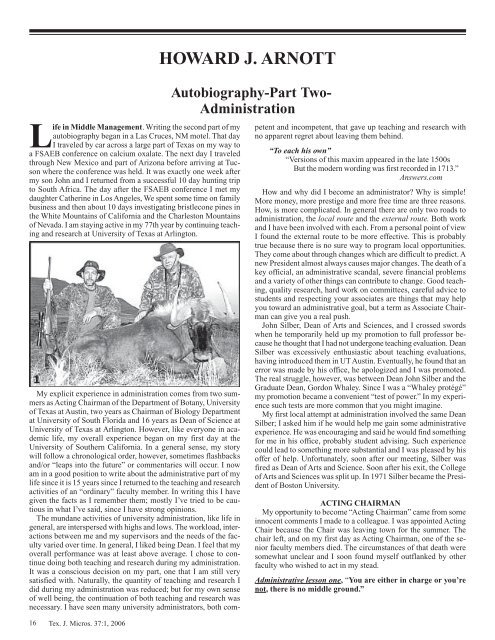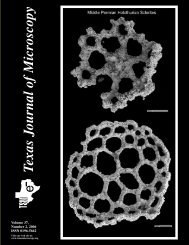Texas Journal of Microscopy Texas Journal of Microscopy
Texas Journal of Microscopy Texas Journal of Microscopy
Texas Journal of Microscopy Texas Journal of Microscopy
You also want an ePaper? Increase the reach of your titles
YUMPU automatically turns print PDFs into web optimized ePapers that Google loves.
Life in Middle Management. Writing the second part <strong>of</strong> my<br />
autobiography began in a Las Cruces, NM motel. That day<br />
I traveled by car across a large part <strong>of</strong> <strong>Texas</strong> on my way to<br />
a FSAEB conference on calcium oxalate. The next day I traveled<br />
through New Mexico and part <strong>of</strong> Arizona before arriving at Tucson<br />
where the conference was held. It was exactly one week after<br />
my son John and I returned from a successful 10 day hunting trip<br />
to South Africa. The day after the FSAEB conference I met my<br />
daughter Catherine in Los Angeles, We spent some time on family<br />
business and then about 10 days investigating bristlecone pines in<br />
the White Mountains <strong>of</strong> California and the Charleston Mountains<br />
<strong>of</strong> Nevada. I am staying active in my 77th year by continuing teaching<br />
and research at University <strong>of</strong> <strong>Texas</strong> at Arlington.<br />
My explicit experience in administration comes from two summers<br />
as Acting Chairman <strong>of</strong> the Department <strong>of</strong> Botany, University<br />
<strong>of</strong> <strong>Texas</strong> at Austin, two years as Chairman <strong>of</strong> Biology Department<br />
at University <strong>of</strong> South Florida and 16 years as Dean <strong>of</strong> Science at<br />
University <strong>of</strong> <strong>Texas</strong> at Arlington. However, like everyone in academic<br />
life, my overall experience began on my first day at the<br />
University <strong>of</strong> Southern California. In a general sense, my story<br />
will follow a chronological order, however, sometimes flashbacks<br />
and/or “leaps into the future” or commentaries will occur. I now<br />
am in a good position to write about the administrative part <strong>of</strong> my<br />
life since it is 15 years since I returned to the teaching and research<br />
activities <strong>of</strong> an “ordinary” faculty member. In writing this I have<br />
given the facts as I remember them; mostly I’ve tried to be cautious<br />
in what I’ve said, since I have strong opinions.<br />
The mundane activities <strong>of</strong> university administration, like life in<br />
general, are interspersed with highs and lows. The workload, interactions<br />
between me and my supervisors and the needs <strong>of</strong> the faculty<br />
varied over time. In general, I liked being Dean. I feel that my<br />
overall performance was at least above average. I chose to continue<br />
doing both teaching and research during my administration.<br />
It was a conscious decision on my part, one that I am still very<br />
satisfied with. Naturally, the quantity <strong>of</strong> teaching and research I<br />
did during my administration was reduced; but for my own sense<br />
<strong>of</strong> well being, the continuation <strong>of</strong> both teaching and research was<br />
necessary. I have seen many university administrators, both com-<br />
16 Tex. J. Micros. 37:1, 2006<br />
HOWARD J. ARNOTT<br />
Autobiography-Part Two-<br />
Administration<br />
petent and incompetent, that gave up teaching and research with<br />
no apparent regret about leaving them behind.<br />
“To each his own”<br />
“Versions <strong>of</strong> this maxim appeared in the late 1500s<br />
But the modern wording was first recorded in 1713.”<br />
Answers.com<br />
How and why did I become an administrator? Why is simple!<br />
More money, more prestige and more free time are three reasons.<br />
How, is more complicated. In general there are only two roads to<br />
administration, the local route and the external route. Both work<br />
and I have been involved with each. From a personal point <strong>of</strong> view<br />
I found the external route to be more effective. This is probably<br />
true because there is no sure way to program local opportunities.<br />
They come about through changes which are difficult to predict. A<br />
new President almost always causes major changes. The death <strong>of</strong> a<br />
key <strong>of</strong>ficial, an administrative scandal, severe financial problems<br />
and a variety <strong>of</strong> other things can contribute to change. Good teaching,<br />
quality research, hard work on committees, careful advice to<br />
students and respecting your associates are things that may help<br />
you toward an administrative goal, but a term as Associate Chairman<br />
can give you a real push.<br />
John Silber, Dean <strong>of</strong> Arts and Sciences, and I crossed swords<br />
when he temporarily held up my promotion to full pr<strong>of</strong>essor because<br />
he thought that I had not undergone teaching evaluation. Dean<br />
Silber was excessively enthusiastic about teaching evaluations,<br />
having introduced them in UT Austin. Eventually, he found that an<br />
error was made by his <strong>of</strong>fice, he apologized and I was promoted.<br />
The real struggle, however, was between Dean John Silber and the<br />
Graduate Dean, Gordon Whaley. Since I was a “Whaley protégé”<br />
my promotion became a convenient “test <strong>of</strong> power.” In my experience<br />
such tests are more common that you might imagine.<br />
My first local attempt at administration involved the same Dean<br />
Silber; I asked him if he would help me gain some administrative<br />
experience. He was encouraging and said he would find something<br />
for me in his <strong>of</strong>fice, probably student advising. Such experience<br />
could lead to something more substantial and I was pleased by his<br />
<strong>of</strong>fer <strong>of</strong> help. Unfortunately, soon after our meeting, Silber was<br />
fired as Dean <strong>of</strong> Arts and Science. Soon after his exit, the College<br />
<strong>of</strong> Arts and Sciences was split up. In 1971 Silber became the President<br />
<strong>of</strong> Boston University.<br />
ACTING CHAIRMAN<br />
My opportunity to become “Acting Chairman” came from some<br />
innocent comments I made to a colleague. I was appointed Acting<br />
Chair because the Chair was leaving town for the summer. The<br />
chair left, and on my first day as Acting Chairman, one <strong>of</strong> the senior<br />
faculty members died. The circumstances <strong>of</strong> that death were<br />
somewhat unclear and I soon found myself outflanked by other<br />
faculty who wished to act in my stead.<br />
Administrative lesson one, “You are either in charge or you’re<br />
not, there is no middle ground.”




